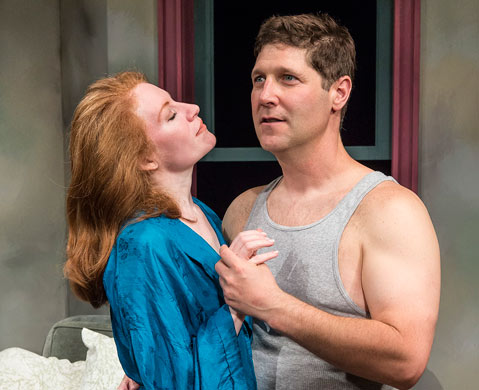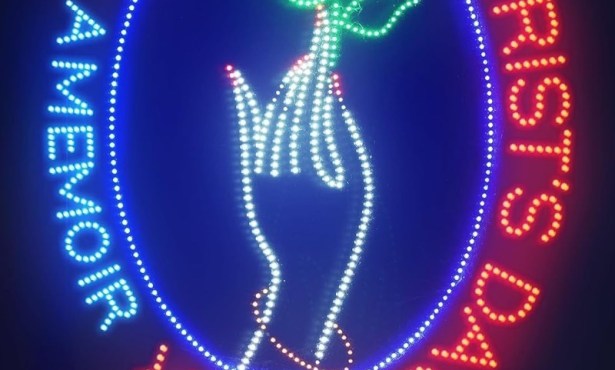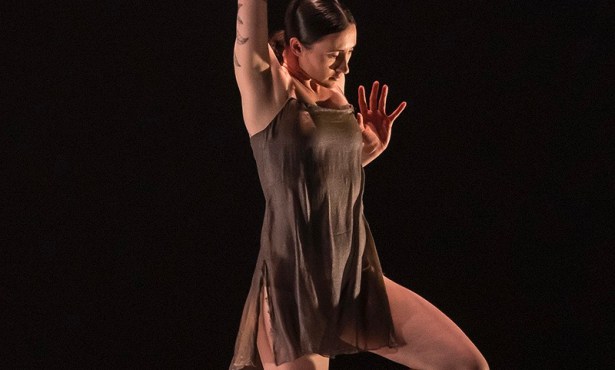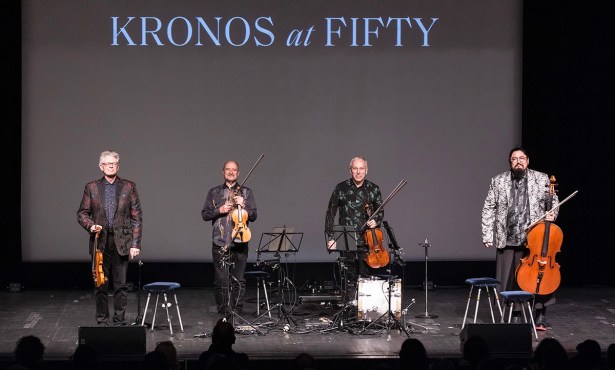Frankie and Johnny in the Clair de Lune at the Alhecama Theatre
Ensemble Theatre Company Presents a Story of Lost Souls Found in Hell’s Kitchen

Since at least the mid-1950s, when the critic David Sylvester dubbed a certain kind of new play appearing on British stages with the term “kitchen-sink realism,” there has been no shortage of theater about the squalid lives of working-class people. The characters live in rented rooms, and their options are limited. The dramatic interest of their circumstances lies primarily in how they express frustration. And this is what makes Terence McNally’s canny 1980s update of the genre, Frankie and Johnny in the Clair de Lune, such an interesting specimen — because in this kitchen-sink drama, the sink is only a few feet from the bed, and both of the characters can cook. Instead of beginning in a moment of frustration, Frankie and Johnny starts with what ought to be the opposite: an instant of mutual gratification and climax. As the lights come up, the Frankie (Dee Ann Newkirk) and Johnny (Rick Gifford) are in bed, and making the most of it. The fact that the whole play unfurls from the starting gun of an orgasm effectively undoes the ordinarily ubiquitous factor of unresolved sexual tension, substituting in its place the profound mystery of what comes next; a challenge that proves much more difficult for the two characters than finding their way into bed.
This is a great script for actors, and Gifford takes the first deep dive into it, running his mouth about everything and anything in what is at first a vain attempt to get the woman who was so willing to be his lover to open up to him as a friend, as well. Gifford’s edgy, slightly manic intensity leaves Newkirk with plenty to work with, and she counters with a series of increasingly pointed gestures all oriented around the goal of shutting this guy up and getting him out of her cramped studio. As the night progresses toward morning, the room morphs from bedroom to kitchen and crow’s nest. Peering out of Frankie’s big bay window at the wide variety of mayhem visible across the alley provides the pair with one kind of diversion; listening to music on the radio and calling the station to make a request offers another, more crucial escape. Inevitably, though, this short-order cook and his waitress dream girl must confront what’s thrown them together and decide what to do about the fact that now it’s tearing them apart.
As Johnny takes great pleasure in pointing out, Frankie and Johnny have a lot in common. There’s the famous couple of the same name from the ballad, of course, but in this play there’s also quite a number of circumstantial coincidences that lead him to conclude that they were meant for each other. She’s not so sure, mostly because she knows what he’s not ready to admit — the real thing they have in common is their desperate flight from past traumas. It’s a familiar pattern to be sure, but in the hands of these fine actors and director Saundra McClain, there’s never a false move or an overly indicated emotion. And what an emotional journey this is! From after midnight until dawn, the two lovers travel from ecstasy to anguish and back, experiencing a fearsome vulnerability that, by turn, angers and engages them. It’s not for the squeamish — there’s plenty of cursing, open talk about sex, and even some brief nudity — but like the sun that shines through the bay window at the end of the show, Frankie and Johnny delivers warmth and light.



